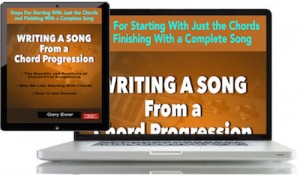There is a kind of rule of life that most of us are familiar with: that the time it takes to complete a job expands to fill the time allotted to it. In short, if you give yourself a week to finish a task, it will take a week.
 If you like starting songs by working out the chord progression first, you will love “Writing a Song From a Chord Progression.” It’s part of the 10-eBook “Essential Secrets of Songwriting” Bundle.
If you like starting songs by working out the chord progression first, you will love “Writing a Song From a Chord Progression.” It’s part of the 10-eBook “Essential Secrets of Songwriting” Bundle.
I encounter this rule — called Parkinson’s Law — all the time in the music world. A few years ago I had been hired to rehearse a choir and then conduct the performance, with everything to happen on one weekend.
So I chose seven or eight choral pieces, and got to work. We had a Friday evening, a Saturday morning and afternoon, and then a Sunday morning to learn the music. The concert happened on the Sunday afternoon.
And it sounded quite good. These were not professional singers. They were typically community choir singers from many different locations, all singing purely for the fun of it. In their own choirs, it would normally take three months to learn the music I had given them.
And I maintain that if we had been given three months, it would have taken three months. But because we were given less than three days, everything seemed to happen much more quickly. That’s Parkinson’s Law.
In songwriting, Parkinson’s Law is a very clear and sometimes burdensome reality. Most of the time you aren’t given a deadline to write a song, but as you know, deadlines abound in the music world whether you think of them as deadlines or not. You’re either writing a song for your next album, or perhaps for your next performance, or for a rehearsal with the band that’s scheduled for tomorrow.
But most of the time, you’re not under the pressure of a real deadline. In fact, one of the problems you likely face is knowing when to declare a song finished, so that you can move on to the next one.
Parkinson’s Law can be in play even if you haven’t set a deadline for yourself as a songwriter, because in the absence of a clear deadline to get a song written, you default to thinking that you’ve always got tomorrow.
And because you think you’ve always got tomorrow, you get stuck in a writing rut, always fixing that song, never satisfied, and always thinking that you’ve got another day to work on it.
If this kind of rut has been plaguing you, it’s time to get moving forward again. If you’re stuck working on one song with no ability to declare it finished, and then move on, try these three tips:
- Set yourself a real deadline. For that song you’re struggling with, set a date — and make it soon — even along with a time of day, at which time the song will be done. If you commit to it, you’ll be surprised that as the date and time approach, you’ll feel a sense of satisfaction that the project is coming to a conclusion. And you’ll be ready to move on.
- Involve yourself in projects that require the setting of a specific completion date. These are the kind of projects where you usually aren’t the one in charge. Perhaps you’re writing a film score, and the producer needs the music by a certain date. Or maybe there’s an upcoming performance where the song you’re writing is going to be featured.
- Gift a song to a friend or family member. This can be a song that commemorates a birthday, the birth of a child, a wedding, or even a funeral. All of these events have specific dates, and you won’t usually have any control over those dates.
I really believe that as a songwriter, amongst all of the writing you do that has no deadline, you should always have at least one song on the go that does have a real and tangible deadline.
That song that has a specific completion date will serve to remind you that a lot of time can be wasted writing and rewriting the same song, simply because you haven’t structured your writing time.
In the end, setting a completion date will make you feel more successful, and will tighten up and improve your writing technique.
 Written by Gary Ewer. Follow on Twitter.
Written by Gary Ewer. Follow on Twitter.
 “The Essential Secrets of Songwriting 10-eBook Bundle” covers every aspect of how to write great songs. Contains a Study Guide that keeps you focused on becoming a consistently better songwriter. Get today’s FREE DEAL when you make your purchase. Click below for details.
“The Essential Secrets of Songwriting 10-eBook Bundle” covers every aspect of how to write great songs. Contains a Study Guide that keeps you focused on becoming a consistently better songwriter. Get today’s FREE DEAL when you make your purchase. Click below for details.










